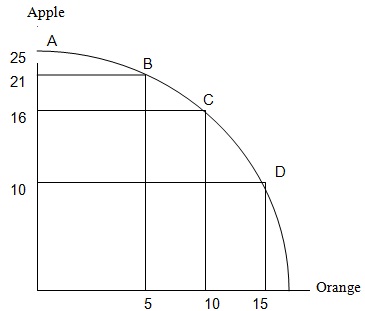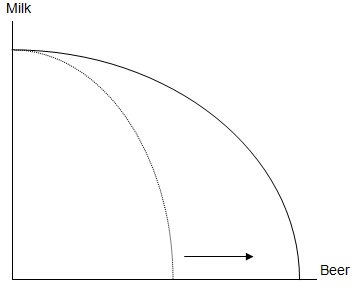BINARY CHOICE QUESTIONS:
Problem 1) With trade a country
a. can consume outside its production possibilities frontier.
b. will be better off if it exports only
Problem 2) Assume that two countries produce only two goods and that each country’s PPF could be described by a linear equation. We are told that the slopes of the two PPFs are different. Consider the following statement: “Since we can say that the opportunity costs for both countries are constant, trade between them is not going to be beneficial”. This statement is:
a. True.
b. False.
Labor requirement per unit
France Italy
bicycle 20 15
DVD 40 45
Problem 3) Please consider the table above. If both countries followed the principle of specialization, France should produce more:
a. bicycles
b. DVD players
Problem 4) The demand for good X increases when the price of good Y falls. Therefore good X is a complement of good Y.
a. True
b. False
Problem 5) Pizza is an inferior good for Bob. When Bob’s income decreases, his consumption of pizza increases.
a. True
b. False
Problem 6) When there is a surplus amount of the good in a market,
a. there are too many buyers chasing too few goods.
b. there is downward pressure on price.
Problem 7) What do you expect a decrease in the price of ice cream to do to the equilibrium price and quantity in the market for hot fudge?
a. The equilibrium price will rise and the equilibrium quantity will rise
b. The equilibrium price will fall and the equilibrium quantity will rise
Problem 8) What is true about a market in which there is a horizontal supply curve?
a. A shift to the right in demand will cause the equilibrium price to rise but the equilibrium quantity will remain constant
b. A shift to the right in demand will cause the equilibrium price to remain constant but the equilibrium quantity will rise
Problem 9) Assume we have a market in equilibrium. Which of the following occurs after a shift to the right in supply?
a. Demand increases in response to the lower price
b. The quantity demanded increases in response to the lower price
Problem 10) Comparative advantage reflects
a. productivity
b. Relative opportunity cost
MULTIPLE CHOICE QUESTIONS:
Problem 11) Ning has 16 working hours per day. She can produce one loaf of bread using 2 hours and produce one gallon of milk using 4 hours. What is the opportunity cost of 1 loaf of bread in terms of gallons of milk?
a. 8 gallons of milk
b. 0.5 gallons of milk
c. 2 gallons of milk
d. 4 gallons of milk
e. 0.4 gallons of milk

Problem 12) Consider an economy which produces two types of fruit; apples and oranges. The above figure depicts the PPF of the economy. The economy reallocates the available resources so that it moves from point B to point D on its PPF. What is the opportunity cost of producing 1 orange in terms of apples when this economy moves from point B to point D?
a. 5 apples
b. 4/5 apples
c. 1.1 apples
d. 10/11 apples
e. 6/5 apples

Problem 13) What is the explanation for the shift in the PPF that is observed in the above picture?
a. An increase in the labor force that can be used in both industries
b. A change in government subsidies that favors the beer industry over the milk industry
c. Technological improvement in the milk industry
d. Technological improvement in the beer industry
e. A change in government subsidies that affect both industries but favors the milk industry over the beer industry
Problem 14) If Misuzu can produce muffins at a lower opportunity cost than Daniel, then
a. Misuzu has a comparative advantage in the production of muffins.
b. Daniel has a comparative advantage in the production of muffins.
c. It is obvious that Misuzu is capable of producing more muffins than Daniel.
d. Daniel does not have the absolute advantage in the production of muffins.
Problem 15) If Spain can produce each unit of wine using fewer resources than Australia, then
a. Australia has an absolute advantage in wine production.
b. Spain has a comparative advantage in wine production.
c. Australia has a comparative advantage in wine production.
d. Australia may have an absolute advantage in wine production.
e. Spain has an absolute advantage in wine production
Labor requirement per unit
Sue John
Homework 3 hours 4 hours
Cake 6 hours 2 hours
Problem 16) Please refer to the table above. Which statement is true?
a. Gains from trade are possible if Sue writes the homework and John bakes the cakes.
b. No gains from trade are possible.
c. Neither Sue nor John has a comparative advantage in producing either good.
d. Gains from trade are possible if John writes the homework and Sue bakes the cakes.
The maximum quantities of goods that can be produced in 1 week
Isil Ben
Apples 200 pounds 100 pounds
Bananas 50 pounds 20 pounds
Problem 17) Please refer to the table above. For Ben, the opportunity cost of producing one additional pound of bananas is:
a. 2.5 pounds of apples
b. 10 pounds of apples
c. 4 pounds of apples
d. 5 pounds of apples
e. 1/5 pound of apple
Problem 18) Again, please consider the table above. Assume that Isil and Ben have identical resources. Ben has __________.
a. Absolute advantage in producing apples only.
b. Comparative advantage in producing both apples and bananas.
c. Absolute advantage in producing bananas only.
d. Comparative advantage in producing apples.
e. Absolute advantage in producing both apples and bananas.
Problem 19) We are told that the opportunity cost of a helicopter is 20 cars in India and 40 cars in Canada. Then we can conclude:
a. India has the absolute advantage in helicopter production.
b. Trade is not going to be beneficial for India.
c. India is a more efficient economy than Canada.
d. India has a comparative advantage in car production.
e. Nothing about which country has the absolute advantage in helicopter production.
The next 3 questions are based on the following information:
Consider the city of Madison.
Let the demand for bread be described by P = 10 - QD
Let the supply of bread be described by P = 2 + QS
Problem 20) Find the market equilibrium.
a. Price=$3, Quantity=5
b. Price=$4 , Quantity=6
c. Price=$6, Quantity=8
d. Price=$6 , Quantity=4
e. Price=$4 , Quantity=2
Problem 21) The city of Madison sets a price ceiling of $3 in the bread market. Is there a surplus or a shortage in the bread market after the imposition of the price ceiling? How much?
a. Surplus, 2 units of bread
b. Surplus, 6 units of bread
c. Shortage, 6 units of bread
d. Shortage, 2 units of bread
e. Neither surplus nor shortage, 0 units of bread
Problem 22) What would the price ceiling level have to be for the quantity supplied of bread to be equal to 3 units?
a. $5
b. $3
c. $4
d. $2
e. $6
The next 4 questions are based on the following information:
Consider the city of Madison.
Let the demand for beer be described by P = 12- QD
Let the supply of beer be described by P = 2QS
Problem 23) Suppose that the city of Madison imposes a tax of $3/unit on the sellers. What is the new equilibrium price after the imposition of tax?
a. $5
b. $6
c. $7
d. $8
e. $9
Problem 24) What is the change in the consumer surplus due to the tax? How much is the deadweight loss?
a. Change in the consumer surplus = $8, deadweight loss = $3
b. Change in the consumer surplus = $4.5, deadweight loss = $3
c. Change in the consumer surplus = $4.5, deadweight loss = $1.5
d. Change in the consumer surplus = $3.5, deadweight loss = $1.5
e. Change in the consumer surplus = $3.5, deadweight loss = $3
Problem 25) How much does the city government collect as the tax revenue? How much of it is paid by the consumers?
a. Tax revenue = $9, consumers pay = $0
b. Tax revenue = $9, consumers pay = $3
c. Tax revenue = $9, consumers pay = $6
d. Tax revenue = $12, consumers pay = $3
e. Tax revenue = $12, consumers pay = $9
Problem 26) Consider the initial market equilibrium (before a tax of $3 was imposed on the sellers). What should the tax level be for the amount of beer consumed to decrease by 2 units?
a. $4/unit on the sellers
b. $5/unit on the sellers
c. $6/unit on the sellers
d. $7/unit on the sellers
e. $2/unit on the sellers
Problem 27) The equilibrium quantity exchanged in the market for apples has just increased. Which of the following could explain this higher equilibrium quantity and also be the cause of a higher equilibrium price in the market for apples?
a. The price of apple juice recently decreased
b. Apple farmers just had an unusually large harvest
c. The price of pears (a substitute for apples) recently increased
d. A new medical study cites apple consumption as a source of depression
e. None of the above
Problem 28) Consider the market for pizza, which is in equilibrium. Two events take place simultaneously:
- The price of cheese increases, and
- It is discovered that pizza contains zero net carbs (note: a recent health study advocates reducing daily carbohydrate intake).
What will happen to the equilibrium quantity and to the equilibrium price in the pizza market?
a. The equilibrium quantity exchanged will rise, and the effect on the equilibrium price is ambiguous
b. The equilibrium quantity exchanged will fall, and the equilibrium price will rise
c. The effect on the equilibrium quantity exchanged is ambiguous, and the effect on the equilibrium price is also ambiguous
d. The effect on the equilibrium quantity exchanged is ambiguous, and the equilibrium price will rise
e. The equilibrium quantity exchanged will rise, and the equilibrium price will rise
The next 2 questions are based on the following information:
Suppose market demand for shaving cream is given by QD = -(1/2)P + 10 and market supply is given by QS = 2P - 5.
Problem 29) The equilibrium price and quantity in this market is
a. Q = 6, P = $7
b. Q = 4, P = $6
c. Q = 4, P = $3
d. Q = 7, P = $9
e. Q = 7, P = $6
Problem 30) Say the demand curve in the market for shaving cream changes. When the new demand curve is graphed with the price variable on the vertical axis and the quantity variable on the horizontal axis, we observe that it is still linear and has the same vertical intercept as the initial demand curve, but now has a slope of -1. The equilibrium price in the market will now be ________, and the equilibrium quantity will be _______.
a. higher, higher
b. lower, lower
c. higher, lower
d. lower, higher
e. It is impossible to tell without more information